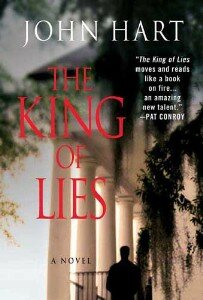SHELF LIFE- Roiling, boiling: Crime thriller wins critical favor
The King of Lies
By John Hart
320 pages, $22.95
St. Martin's Minotaur
"Seething, roiling, boiling."
These are words not often used to describe fiction, least of all in the New York Times to describe that rare first novel that charms and disarms the critics. But that describes the sort of yarn that John Hart had on display when he spoke about his first novel, The King of Lies, at a New Dominion Bookshop event Thursday, June 15.
The critical reception has been remarkably favorable for a first novel, especially one that in some ways resembles the pulp thrillers and murder mysteries lining the racks of airport newsstands, one that has been described as a cross between "Grisham-style intrigue" and "[Scott] Turow-style brooding. The same critic observed, that makes for an "effective melodrama."
At New Dominion, Hart's enthusiasm about the encouraging critical response was apparent: "To think that someone could be reading the book on a beach in Japan next year," Hart mused– not inconceivable, as the book has already been translated into eight languages. A screenplay is also rumored to be in the works.
No small achievement for a former criminal defense attorney from a small town in North Carolina.
Set in Hart's hometown of Salisbury, the story is told from the perspective of Jackson Workman Pickens, a character who, at least superficially, could be Hart's alter ego. Known as "Work," he's a clever, quick-witted, articulate lawyer and a quintessential male hero: aggressive, occasionally irreverent, toughminded.
We hope that the similar professional backgrounds is as far as the comparison goes. Work is scarred by the overbearing influence of his calculating and manipulative father, the notorious Salisbury attorney Ezra Pickens, who disappeared after accidentally killing Work's mother.
Work's mother's death was the culmination of a decades-old family drama fueled by Ezra's ruthless ambition. When Ezra's body finally surfaces a year after his disappearance, the onus falls on Work to reconcile all of the unresolved issues of his and his family's past: two failed marriages, a suicidal sister (his last trace of family and his only source of stability), and allegations of patricide.
Told in first person, the novel follows the tortuous track of Work's inner life as he attempts to resolve each of the conflicts, struggling all the while to quiet the suspicions of a small town that has turned against him.
Reluctant to play the spoiler, Hart spent much of the time speaking about the writer's vocation as it complemented his career in the law (he's now affiliated with Merrill Lynch) and as it has affected his daily life. He assured the audience that the novel's success was not as easily won as it might seem.
Hart's third major attempt at a book-length story, he said, was actually a "13-year overnight success story" after a decade spent developing his craftsmanship. He also noted that the book took one year to write, one year to find an agent, and one year to be published.
Like his more well-known contemporaries, Turow and local favorite Grisham, Hart had had extensive legal experience before experiencing any success as a writer. His law practice influenced and informed his writing just as it motivated and inspired it. Although he believes that legal experience can furnish a writer with compelling subject matter– "You see a lot of interesting stuff," he said-– Hart expressed general dissatisfaction with his day job.
Is he an idealist? Hart prefers to talk about quitting his job at the age of 35 to work on the novel: "I'm a lifestyler," he says. Although the life is somewhat less secure, he says, "If you succeed, you have the ultimate freedom."
Such professional freedom is an achievement, no doubt, but sustainable only insofar as the mystery is compelling.

#